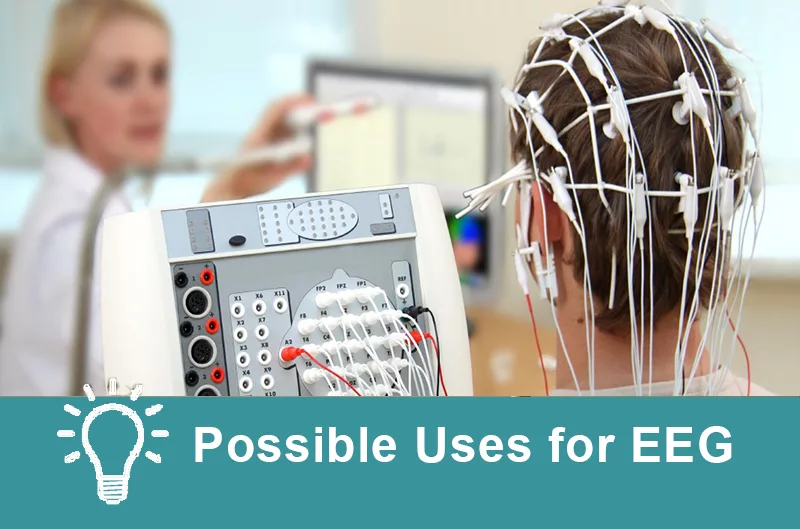First developed in the 1920s, EEG entails applying electrodes to the scalp’s surface to measure electricity generated by neural activity. The brain works primarily via action potentials that lead to the release of neurotransmitters into synaptic clefts. Although EEG can’t detect the tiny amount of electricity produced by the individual neurons, visible waves or spikes are generated when neuron clusters fire synchronously.
Excerpted from this article in The Carlat Psychiatry Report, the following are some reasons why you might want to use EEGs with your patients:
To rule out organicity
The most common reason for psychiatrists to order EEGs is to assess whether a patient’s psychiatric symptoms might have a neurological cause. This is usually in the context of a confusing clinical picture, where something doesn’t quite fit what we would normally expect for a diagnosis. Such atypical situations might include atypical psychosis; episodic anxiety or rage attacks; and dementia that appears to wax and wane. The literature is full of case studies of patients with other atypical symptoms who turned out to have some abnormal aspects to their EEGs.
As biomarkers of psychiatric disorders
The newer batch of EEG studies explores whether tracings can be used to diagnose specific psychiatric disorders. For example, for mood disorders, the largest trial to date was an international, prospective, randomized trial that compared baseline EEGs in 667 patients with major depressive disorder (MDD) and 336 healthy controls. While some differences between groups were noted, none significantly correlated with MDD (Arns M et al, Clin Neurophysiol2016;127(1):509–519).
Using EEG to diagnose ADHD seems slightly more promising. In one large study, EEG did demonstrate differences between children with ADHD (n = 347) and controls (n = 619). However, these differences overlapped with autism spectrum disorder, limiting the utility of EEG to aid in ADHD diagnosis (Duffy FH et al, BMC Med 2017;15(1):51). The inconclusive nature of the data led the American Academy of Neurology to discourage the use of EEG for diagnosing ADHD.
To predict antidepressant response
It’s possible that EEG might be able to identify patients who are destined to respond to certain medications, making our jobs easier when it comes to choosing among the wide array of treatments.
The most recent paper compared 146 patients on Lexapro with 48 on placebo (Leuchter AF et al, J Psychiatr Res 2017;84(1):174–183). The marker predicted remission with about a 60% sensitivity and 75% specificity. This means it correctly identified 6 out of 10 future remitters. Of every 10 future Lexapro responders, the test would identify 6 of them, but would miss 4. While intriguing, this EEG prediction technique is probably no improvement on clinical judgment, and so is not yet ready for prime time.
Subscribers can read the entire article here. Not a subscriber? Join here.
Excerpted from this article in The Carlat Psychiatry Report, the following are some reasons why you might want to use EEGs with your patients:
To rule out organicity
The most common reason for psychiatrists to order EEGs is to assess whether a patient’s psychiatric symptoms might have a neurological cause. This is usually in the context of a confusing clinical picture, where something doesn’t quite fit what we would normally expect for a diagnosis. Such atypical situations might include atypical psychosis; episodic anxiety or rage attacks; and dementia that appears to wax and wane. The literature is full of case studies of patients with other atypical symptoms who turned out to have some abnormal aspects to their EEGs.
As biomarkers of psychiatric disorders
The newer batch of EEG studies explores whether tracings can be used to diagnose specific psychiatric disorders. For example, for mood disorders, the largest trial to date was an international, prospective, randomized trial that compared baseline EEGs in 667 patients with major depressive disorder (MDD) and 336 healthy controls. While some differences between groups were noted, none significantly correlated with MDD (Arns M et al, Clin Neurophysiol2016;127(1):509–519).
Using EEG to diagnose ADHD seems slightly more promising. In one large study, EEG did demonstrate differences between children with ADHD (n = 347) and controls (n = 619). However, these differences overlapped with autism spectrum disorder, limiting the utility of EEG to aid in ADHD diagnosis (Duffy FH et al, BMC Med 2017;15(1):51). The inconclusive nature of the data led the American Academy of Neurology to discourage the use of EEG for diagnosing ADHD.
To predict antidepressant response
It’s possible that EEG might be able to identify patients who are destined to respond to certain medications, making our jobs easier when it comes to choosing among the wide array of treatments.
The most recent paper compared 146 patients on Lexapro with 48 on placebo (Leuchter AF et al, J Psychiatr Res 2017;84(1):174–183). The marker predicted remission with about a 60% sensitivity and 75% specificity. This means it correctly identified 6 out of 10 future remitters. Of every 10 future Lexapro responders, the test would identify 6 of them, but would miss 4. While intriguing, this EEG prediction technique is probably no improvement on clinical judgment, and so is not yet ready for prime time.
Subscribers can read the entire article here. Not a subscriber? Join here.


_-The-Breakthrough-Antipsychotic-That-Could-Change-Everything.webp?t=1729528747)



